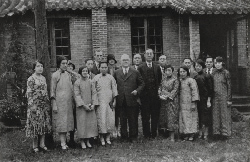A Homecoming in a Faraway Land
TC's President spends a week in China, renewing and strengthening a century-long partnership
TC's President spends a week in China, renewing and strengthening a century-long partnership
"Appreciation for the discipline and tradition of Chinese education is growing throughout the United States. Our two education systems are moving closer together, with China seeking ways to inspire greater creativity and independent-mindedness among its students, and the United States striving to learn from China's emphasis on content knowledge and work ethic."
With those words, delivered to 130 TC and Columbia University alumni in Hong Kong on June 18th, TC President Susan Fuhrman kicked off her weeklong tour of China. Over that stretch, she visited three cities, spoke at alumni events for both TC and Columbia, chaired a television panel on the state of U.S.-Chinese educational exchange, addressed a roundtable of Chinese education leaders at the Shanghai Expo Forum and gave the keynote address at a symposium in Beijing that commemorated the unique century-long relationship between TC and China.
That relationship began early in the 20th century when a remarkable group of Chinese students enrolled at the College, and upon returning to China, adapted TC's progressive ideals to China's educational landscape. That group--which included Tao Xingzhi, Hu Shi, Zhang Boling and Chen Heqin--are viewed as the architects of China's modern school system. Subsequently, several TC faculty members visited China, including John Dewey, who delivered more than 200 lectures there over a two year period.
Fuhrman herself is an old "China hand," having spent 11 years building programs between the U.S. and China during her tenure as Dean of the University of Pennsylvania's Graduate School of Education. She has also served as an advisor on curriculum development to the Shanghai Education Commission, and last year was named an honorary faculty member at Beijing Normal University.
"Native New Yorkers like me are drawn to cosmopolitan centers of creativity and imagination--so we feel very much at home in Shanghai," she told her audience at the Expo Forum.
Many current TC faculty members have long been collaborating with educators in China--especially Mun Tsang, founding Director of the College's Center on Chinese Education. Tsang organized the "Centenary Anniversary" conference at Beijing Normal where Fuhrman spoke, and he was honored there as an "International Scholar for Excellent Contributions to Chinese Educational Development."
However, the College's institutional involvement in China has significantly increased under Fuhrman. Recently, TC has partnered with East China Normal University to enable undergraduates at the university who aspire to teach to come to TC for intensive preparatory courses. Another program is bringing Chinese high school students to TC for preparation for enrollment at top U.S. colleges and universities. The College is also forging strong ties with the government of Shanghai-Pudong and China's National Academy of Educational Administration.
Given TC's own urban legacy and the massive numbers of people flowing into China's major metropolises, much of this work has an urban cast.
"At Teachers College, we view the current era as 'the learning century'--a moment when, perhaps for the first time in history, advances in education theory and practice can make cities more livable, prosperous and sustainable," Fuhrman said in her roundtable address in Shanghai. She went on to stress the connections between the quality of a city's schooling and its long-term health and viability, citing the landmark work of the late TC faculty member A. Harry Passow in documenting the relationship in the 1960s between Washington's struggling schools and the city's generally ebbing fortunes.
But while TC has definitely been a leader in working with China, it was clear from the televised panel Fuhrman co-chaired with Dr. Yu Lizhong of East China Normal University that U.S.-Chinese educational exchange is in general alive, well and drawing widespread interest. The event--part of the U.S.-China Future Leaders Program--drew a live audience of some 300 students and educators, both from Chinese institutions and top U.S. schools such as Columbia, Harvard, Johns Hopkins and the University of Pennsylvania.
Yet TC, with its long history of partnership with China, may enjoy one very important edge in the region over other American institutions: its local alumni base. Among them is Edith Shih (Ed.M., '78, M.A.,'77), who is Head Group General Counsel and Company Secretary for Hutchison Whampoa Limited, a Fortune 500 company with more than 250,000 employees worldwide. Shih, who is a member of the TC President's Advisory Council, is working to help the College establish a scholarship fund to bring promising Chinese students to TC.
"This is an extremely important initiative," says Cheng Davis, who recently joined TC as the President's Special Advisor for International Advancement, and who helped plan much of the China trip. "China and Asia in general are an enormously important student market."
That TC's President chose to spend a week visiting the region sends an important signal to alumni and prospective students alike, Davis said, and further boosts the College's visibility there.
Still, it was clear that TC reputation was already quite strong.
"We are so grateful to TC," said Yanan Wang, a former visiting psychology scholar at the College. Wang and his wife made the 125-mile trip from Nanjing, where he is now a professor at Nanjing University, to hear Fuhrman speak in Shanghai. "It was there that we met a lot of amazing people and changed the way we look at the world."
Published Wednesday, Sep. 1, 2010

